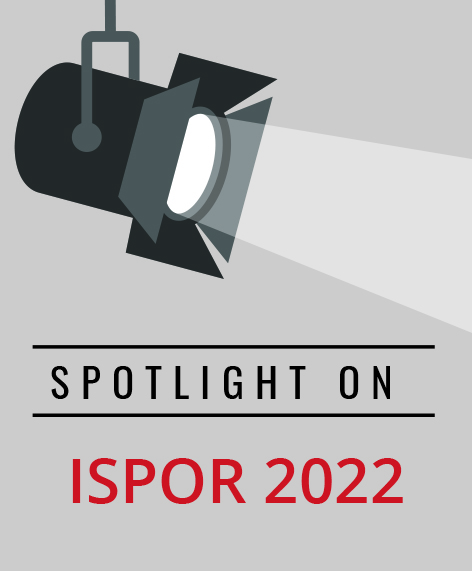The Patient (Finally) at the Center: How Can We Leverage Digital Data to Make Patient-Focused Decisions?
Trupti Dhumal, MS, BPharm, West Virginia University, Morgantown, WV, USA
With each passing day, greater importance is given on devising patient-centric strategies in healthcare and treatment decision making. Digital health has been crucial for various organizations that are interested in leveraging patient-centric data for better patient experience, improving outcomes, and devising better paradigms for treatment decision making. However, increased reliance on digitized data also introduces concerns with regards to patient privacy and data protection.
The focus of this plenary session was making the best use of digital health data while maintaining patient data protection and privacy.
Before the start of the session, ISPOR’s CEO Nancy Berg gave the closing remarks. She thanked Isao Kamae, DrPH, MD (current president) and the board of directors for their exemplary contribution to ISPOR. She also thanked the conference program committee on their outstanding work. The next ISPOR meeting will be ISPOR Europe to be held in Vienna, Austria, whereas the next annual meeting-ISPOR 2023-will be held in Boston, MA. The ISPOR 2022 program committee co-chairs, Ran Balicer, Eberechukwu Onukwugha, and Daniel Ollendorf, were introduced and thanked for their tremendous efforts.
The session moderators included ISPOR’s Chief Science Officer, Richard J. Willke, PhD, and Daniel Ollendorf, PhD, MPH (Tufts Medical Center, USA). In light of the increased discussions in the research community about exploring novel ways to use existing data sets, the goal of the plenary session was to channel our attention towards exploring novel and innovative ways to data collection and optimization while maintaining data integrity and protection.
Figure. Session moderators and panelists.
-at-the-center-figure.jpg?sfvrsn=40020b09_0&MaxWidth=600&MaxHeight=600&ScaleUp=false&Quality=High&Method=ResizeFitToAreaArguments&Signature=BEA8B8C32C788FB0F32E38709081FBF4923D7981)
The first speaker, Cat Davis Ahmed, MBA (Family Heart Foundation, USA) provided insightful input on the urgency of optimizing patient-centric data by sharing her personal experiences. She talked about familial hypercholesterolemia and elevated lipoprotein (a genetic disorder causing high cholesterol) and her constant efforts towards improving the diagnostic and treatment parameters for this disorder. She mentioned her research study in familial hypercholesterolemia where the aim is to improve detection of and family screening for familial hypercholesterolemia. The study leverages patient data from registries and patient-reported survey data to find solutions for improving outcomes. Ahmed noted, “The data from the patient health record can be utilized to generate better data-driven solutions for diagnostics, treatment patterns, reimbursement decisions at the patient, policy, and provider levels.”
Yvette Venable, BA (Institute of Clinical and Economic Review [ICER], USA) spoke about the direct use of real-world evidence for health technology assessment (HTA) bodies. Venable has been a long-time champion for fair patient access and recognizes the power of real-world and patient-centric data. Although she recognized the recent increase in opportunities for incorporating patient’s opinions in healthcare, the efforts have been inconsistent mainly due to implementation challenges. Her recommendation is finding avenues to look into existing data to fix the practical challenges.
Khaled El Emam, PhD (University of Ottawa, Canada) shed light on the challenges associated with patient data collection. He emphasized on the importance of trust. In his opinion, intervention approaches need to be regulated for privacy and data access. Identification of appropriate technologies to de-identified, transparent data needs to be explored.
Challenges and issues in low- and medium-income countries in patient data protection were addressed by Anurag Agrawal, PhD, MBBS, (CSIR Institute of Genomics and Integrative Biology, India). His suggestion was to promote innovation in digital foundations and to make sure that patient rights and obligations are retained.
After opening remarks, Ollendorf asked the panelists to share their views on the use of RWD for regulatory, HTA, and patient decision making. Venable spoke about the source of patient data and opportunity for patient input. A few of the data sources used by ICER included testimonials (patient, care-partner input form, patient interviews), working with patient communities (where data is already developed), partnering directly with patient groups, and post-assessments. Ahmed thought that there was still a lot of potential to build on this opportunity.
“When you are collecting data, patients are concerned about sharing their data because patients don’t want their data to be used against them (eg, discrimination, denial of care). On the flip side of the coin, patients also expect that if you are collecting the data you will actually use the data to help them.” —Cat Davis Ahmed, MBA
The next question explored how to overcome data privacy issues. According to El Emam, there is still a lot of consent bias. One needs to make a case to develop responsible ways to use data for secondary purposes. Agrawal discussed data protection concerns and solutions, describing the situation in India. “In India, protecting individual rights is most important; concepts of transparency, solidarity, and trust are a common thing,” said Agrawal.
In conclusion, the panelists felt that patients want their data to be used to improve their health and outcomes, improve access, reduce cost, and provide personalized experience. “When you are collecting data, patients are concerned about sharing their data because patients don’t want their data to be used against them (eg, discrimination, denial of care). On the flip side of the coin, patients also expect that if you are collecting the data you will actually use the data to help them,” said Ahmed.

